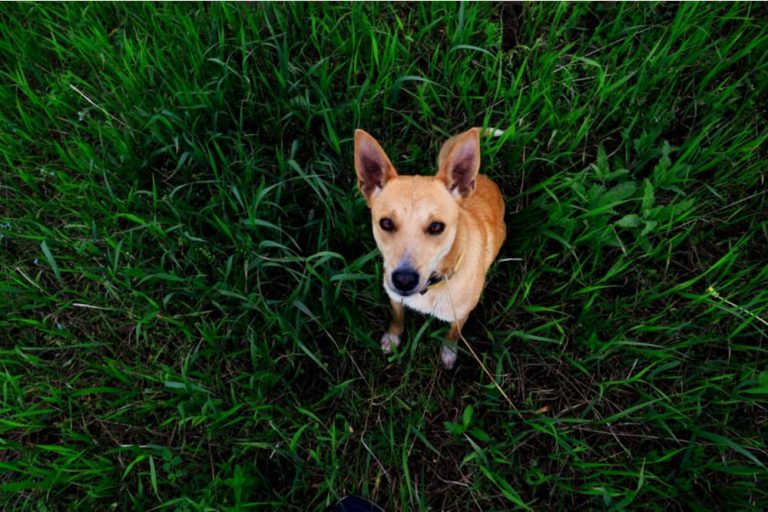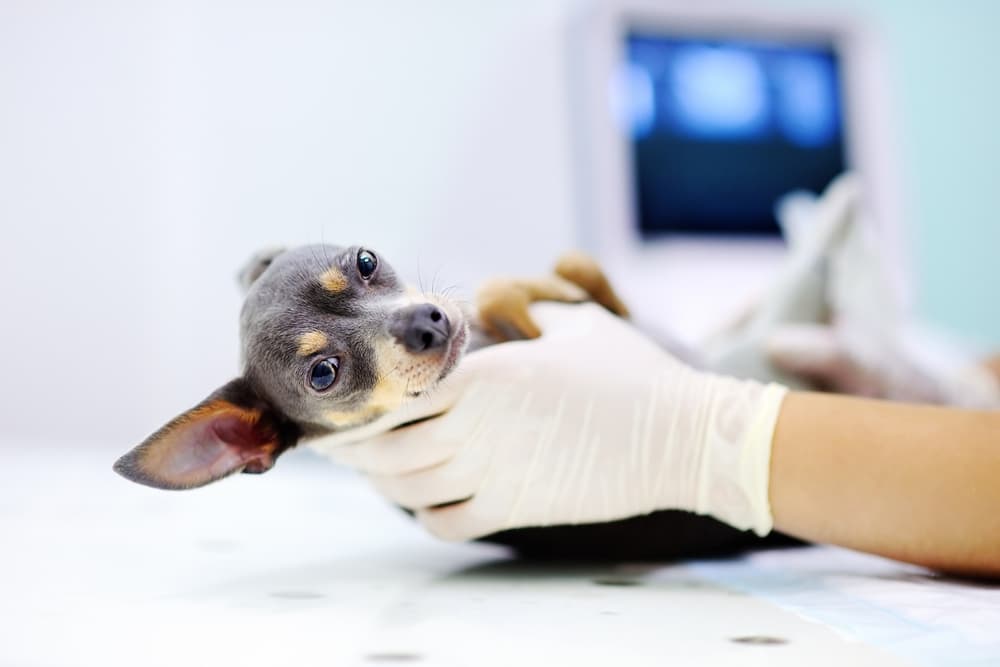Sponsored by CareCredit
Soft Dog Poop: Causes and How to Help

Poop and your pet—it can be a real head-scratcher.
As a pet parent, you already know that your dog’s stool can tell you a lot about their overall health. So when things seem off (maybe your dog’s poop is yellow or has mucus in it), it can be worrisome.
If your dog has soft dog poop, you’re probably worried about what’s causing it and how to help your pet feel better, as well as unexpected costs you may encounter. To prepare for the latter, you might consider a solution like CareCredit, a health and pet care credit card that allows you to pay over time with flexible financing options.*
Whether your dog’s poop starts solid then turns soft, gets softer as the day goes on, or is exhibiting some other odd characteristic, it’s helpful to understand a bit more about what’s going on and when soft dog poop is a cause for concern.
Let’s take a closer look at the types of soft dog poop, treatment options, and general costs.
Soft Dog Poop: An Overview

All featured products are chosen at the discretion of the author. However, Great Pet Care may make a small affiliate commission if you click through and make a purchase.
Soft stool in general is defined as feces that are not fully formed, or that is soft in consistency and cannot be easily picked up. Soft stool—which sometimes looks like soft-serve ice cream in consistency—can progress to diarrhea, which can be serious, says Dr. Ashley Rossman of Glen Oak Dog and Cat Hospital in Glenview, Illinois.
Types of Soft Poop in Dogs

Dog stool can be characterized by several factors, says Dr. Jerry Klein, AKC’s Chief Veterinary Officer. These include:
- Color (including dark brown, light brown, yellow, green, red)
- Texture (including formed, very hard, soft, pudding-like, diarrhea, watery)
- Whether or not mucus is present
- Whether or not blood is present and, if so, whether it’s streaks of blood or completely bloody
- Blood color and consistency (including bright blood, dark blood, purple, black, and tar-like)
If your dog is having issues with soft stool, it can further be categorized as:
Soft-Serve Dog Poop
Watery, formless feces that comes out resembling soft-serve ice cream is often referred to as “soft-serve” dog poop. This type of stool can be a sign that the pet’s microbiome is not balanced. “This can occur if the dog gets into garbage, is eating things in the yard, or is eating other things that are not typical to his or her diet,” says Dr. Rossman. “Changing a dog’s diet too quickly can also cause this, as can stress.” In other cases, a parasite may cause soft stool to appear before it evolves into diarrhea, she adds.
Soft Dog Poop with Mucus
Dog poop that presents with mucus can occur for the same reasons as soft-serve dog poop including a microbiome imbalance, eating inappropriate things, a dietary change that happens too quickly, food allergies, or a parasitic infection.
Orange or Yellow Soft Dog Poop
Feces that are yellow or orange can sometimes be tinged that color if the dog ate something yellow or orange, says Dr. Rossman. Other times, “this can occur from a disease, like exocrine pancreatic insufficiency,” she added. “This is a disease that can be confirmed through a diagnostic test done by your veterinarian.”
Dog Poop Consistency Changes

Sometimes, pet parents notice that their dog’s poop consistency changes throughout the day or even during the course of a bowel movement. These changes are worth noting and sharing with your veterinarian.
When Your Dog’s Poop Starts Solid Then Gets Soft
Poop that changes in consistency during a bowel movement is usually a sign of an unbalanced microbiome. “The first treatment step is to add in a good probiotic,” says Dr. Rossman. “Every veterinarian has an opinion on what probiotics they prefer, and they are not created equally. Be sure to ask your veterinarian for assistance in choosing a brand.”
When Your Dog’s Poop Gets Softer as the Day Goes On
Just like humans, dogs tend to defecate after they’ve eaten. While movement and time of day should not have an impact on your dog’s stool throughout the day in general, “if a patient’s stomach is already upset, then movement can cause increased gastrointestinal motility, and thus soft stool or diarrhea,” says Dr. Rossman.
Dr. Klein adds that it’s not uncommon for some dogs to have a normal bowel movement at the beginning of a walk, and then proceed to have one or more bowel movements where the stool is soft. “This is usually because the fecal contents have not been sitting in the colon long enough for the water to be absorbed,” he says. “If the dog is happy, eating, and not having any accidents, this can be normal behavior.”
Soft Dog Poop Treatment

Helping firm things up is possible, depending on what is causing your dog’s soft poop in the first place. Possible treatments for a dog with soft poop include:
At-Home Options
If your dog is not in distress and there is no blood present in your dog’s poop, trying a few things at home under the guidance of your veterinarian may help to firm up your dog’s stool.
These options include:
- Adding a good daily probiotic.
- Adding organic canned pumpkin (not pumpkin pie filling, says Dr. Klein, as this may contain xylitol, which is toxic for dogs) or other forms of fiber.
- Changing your dog’s food to a bland diet can help, says Dr. Rossman. “Home-cooked bland diets are also acceptable,” she added. “An example would be old-fashioned white rice—not instant—and boneless, skinless cooked chicken breast, or lean cooked hamburger meat.” Do not use spices, salt, butter, or oils when cooking.
Veterinarian Options
If at-home options haven’t helped, your veterinarian can run some diagnostic tests to determine if an underlying cause other than stress or diet—like a health issue—is causing the problem. “An example of one of the many tests is a PCR test that tests for different bacterial, parasitic, and viral pathogens,” says Dr. Rossman.
Recommended treatment options may vary depending on test results. Your veterinarian may prescribe a medication, probiotic, or prescription diet to help firm up your dog’s poop.
Any stool that is abnormal for your dog that persists longer than 48 hours should be reported to your veterinarian, says Dr. Klein. Any dog that has blood in the stool, or a dog that has diarrhea combined with vomiting, poor appetite, or lethargy should be examined by a veterinarian immediately.
General Cost to Treat Soft Dog Poop
Treatment costs fluctuate depending on the level of testing, the cause and severity of the symptoms, and what medications or follow-up care is required.
A typical dog fecal test can range from $25 to $45, while more specialized testing (if indicated) may cost several hundred dollars. Medication prices vary depending on the medication prescribed and the length of time it is needed.
If your dog’s poop is the result of dietary indiscretion, treatment will usually be supportive. If the veterinarian knows your dog ate garbage, for example, they might just treat the resulting diarrhea without a fecal test, especially if your dog is on parasite prevention.
Costs are wide-ranging for the treatment of anything abnormal associated with soft dog poop. Depending on your region, state, and whether an emergency or specialty service is involved, pricing will vary.
Since the type of treatment and associated costs can vary greatly, it helps to be financially prepared for any scenario. CareCredit gives you the flexibility to use your card for everything from exams to diagnostics to medications at locations in the CareCredit network.*

- Pay over time with flexible financing options*
- Use your card again and again for any type of care your pet needs
- Accepted at most veterinary hospitals**
Some of the more frequently administered tests and their associated costs include:
| Abdominal x-ray | $150 – $250 |
| Abdominal ultrasound | $300 – $600 |
| Complete blood panel | $100 – $300 |
| Examination fees | $45 – $85 |
| In-house fecal test | $25 – $45 |
| PCR test | $35 per assay |
| Urinalysis | $30 – $70 |
The Bottom Line on Soft Dog Poop

Any time your dog has a bowel movement that’s abnormal, it’s worth paying attention to. Noting the consistency and timing of the event can help if you do need to consult with a veterinarian down the road.
“Every dog is an individual,” says Dr. Klein. “Work with your veterinarian to find the proper, balanced, age-appropriate diet that works for your dog.” Once you find a diet that works, Dr. Klein suggests sticking with it for the long haul. “Don’t make frequent changes, as most dogs don’t do well with changes in diet,” he says. “Dogs don’t need different or changes in food. They thrive on the proper food for their particular medical and physical needs.”
Dogs should also be kept on year-round parasite prevention.
*Subject to credit approval. See carecredit.com for details.
**Internal estimates based on publicly available market sizing information, as of Feb 2023
This information is shared solely for your convenience. Neither Synchrony nor any of its affiliates, including CareCredit, make any representations or warranties regarding the products described, and no endorsement is implied. You are urged to consult with your individual veterinarian with respect to any professional advice presented.









